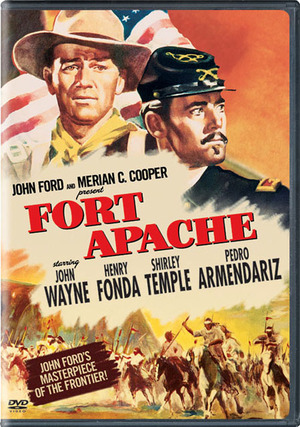 A review of Fort Apache, a key John Ford/John Wayne collaboration. First, a couple of postings sum up the basic plot and themes.
A review of Fort Apache, a key John Ford/John Wayne collaboration. First, a couple of postings sum up the basic plot and themes.
 A review of Fort Apache, a key John Ford/John Wayne collaboration. First, a couple of postings sum up the basic plot and themes.
A review of Fort Apache, a key John Ford/John Wayne collaboration. First, a couple of postings sum up the basic plot and themes.
The first in the "Calvary Trilogy" (She Wore a Yellow Ribbon and Rio Grande). Set in 1876, Lt. Col. Thursday is an ambitious, class conscious and strict Eastcoast career officer who is bitter at being demoted from Civil War general to peace-time Lt. Col. and then being sent to the frontier to fight Indians instead of serving at a more prestigious post. He is not familiar with the special demands of fighting Indians on the frontier (a form of guerrilla warfare), ignores the advice of his more experienced sergeants (like Wayne/York) who wish to make peace with the Indian tribes led by Cochise, and so sends his men to a disastrous defeat (compare Gen. George Custer at Little Big Horn). Luckily for him, the new commander Wayne/York refuses to disabuse the eastern press representatives who interpret his defeat as a heroic "last stand". After singing the praises of the old commander York leads his men out of the fort to fight Geronimo.
The American film historian and critic Andrew Sarris discusses Ford's career during and immediately after the Second World War:
After How Green Was My Valley Ford went on active duty in the Navy as Chief of the Field Photographic Branch, a unit of the Office of Strategic Services (later glorified on the screen as the O.S.S.) (the OSS was the precursor to the CIA — DMH) with offices in Paris and London... He even picked up an extra Oscar for The Battle of Midway, America's first war documentary, and also a Purple Heart for wounds incurred in the engagement. This was shooting in both senses of the word... He is the only American film director who lent his artistic services to the Government through World War II, the Korean War and the Vietnam War... (pp. 109-10)
... Fort Apache was released at a time when Hollywood was afflicted with realistic rigor mortis. Critics of the period lacked the language to describe and evaluate myth and romance. Problems and polemics were the order of the day, and Fort Apache seemed to have nothing new to say. The film's attitudes towards Indians, women, and military discipline seemed either conventional or conservative. Indeed, the final eulogy of John Wayne's Captain Kirby York for his fallen Custer-like commander, Henry Fonda's Colonel Thursday, tends to glorify command decisions to the point of incompetence and even insanity. Moreover, Ford seemed unduly sentimental in healing old wounds incurred in the Civil War by proud soldiers on both sides. Hence, much of the tension between the Fonda and Wayne characters is generated by a series of Yankee-versus-Reb insult routines in which Fonda's officious nastiness is allowed to play against Wayne's submissive exasperation. What unites them — the Seventh Cavalry rather than the Union — is much stronger than what has divided them in the past largely through an accident of geography... (p.126)
... Ford preferred to accept history and even legend as it was written rather than revise it in a radical or derisive spirit. Why are the Indians on the war path from Fort Apache to Cheyenne Autumn? Not, according to Ford, because of American Imperialism or White Racism or Manifest Destiny, but because of the derelictions of the Indian Ring, 'the most corrupt band of politicians in our nation's history'; graft and corruption on the local level rather than greed and conquest on the national level. Thus, the Indian remains the Other in American history and mythology to the end of Ford's career. (p. 128)
In his oustanding work Gunfighter Nation: The Myth of the Frontier in 20thC America Richard Slotkin argues that:
In 1948 John Ford added a major variation to the Western genre by uniting the conventions and concerns of the combat film and the Western in a single coherent fable. In his cavalry trilogy — Fort Apache (1948), She Wore a Yellow Ribbon (1950), and Rio Grande (1950) — Ford used the time and resources of three productions to create and intensively develop a single set of themes, characters, and images. His success was such that he and his many imitators were able to draw on the formulas developed in the sequence to make numerous cavalry Westerns over the next two decades. By transferring the ideological concerns of the World War and its aftermath from the terrain of the combat film to the mythic landscape of the Western, Ford proposed a mythic response to the crisis of postwar ideology that is at once a moral critique of our 'victory" and an affirmation of the importance of the patriotic solidarity that made victory possible. (p. 334)
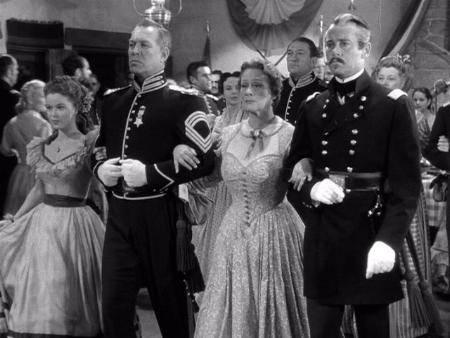
Fort Apache is the first installment in John Ford's unofficial trilogy, commonly dubbed the "Cavalry Trilogy," that continues with She Wore a Yellow Ribbon and concludes with Rio Grande. It serves not only as an impressive re-creation of military life in post-Civil War America, but also as evidence of Ford's maturation. Made after his service in World War II, the film is an examination of military leadership and the high cost of war.
Lt. Col. Owen Thursday (Henry Fonda) arrives at Fort Apache as a man declining in esteem. Accompanied by his comely daughter, Philadelphia (Shirley Temple), Thursday is displeased with his most recent assignment. Stuck in the middle of nowhere to deal with the Apache, who are led by Cochise, Thursday feels slighted by his superiors. Determined to find a way to achieve his previous glory, the fort's commanding officer starts to whip everyone into shape—to the point where he bumps heads with Captain Kirby York (John Wayne). York suggests a more tempered approach to dealing with the Apache, as well as the soldiers, but Thursday will not listen to reason. Things become even more confounded when 2nd Lt. Michael O'Rourke (John Agar), fresh from West Point, begins to court Philadelphia. Determined to assert his authority over his family and soldiers, Thursday's actions put everyone at risk as his poor leadership puts them on a course for war.
The screenplay, by Frank S. Nugent, is somewhat inspired by the exploits of General Custer. Like Custer, Thursday is an atrocious leader who rushes forward to advance his own career. However, thanks to Fonda's performance, there is a buried humanity to the man. Fonda acts against type, playing Thursday as a severely rigid man that seems to be responding to his current predicament. He isn't so much hateful towards the Apache as he is desperate to regain his lost honor, which causes his failings to become more tragic. Wayne offers an excellent counterpoint as York, though his performance is far from the showy cavalry officer one might expect. He seems to be reacting most of the time, offering a moral center to the story instead of serving as a valiant warrior. The two actors work well with one another, creating a compelling conflict within the fort.
Dialog establishes themes
Let's look at the key bits of dialog in Fort Apache—the ones that establish the movie's themes.
An initial exchange sets up the basic conflict between Owen ("I'm not a martinet") Thursday the martinet and Kirby York the good soldier:
Memorable quotes for Fort Apache (1948)
Lt. Col. Owen Thursday: We here have little chance for glory or advancement. While some of our brother officers are leading their well-publicized campaigns against the great Indian nations — the Sioux and the Cheyenne — we are asked to ward off the gnat stings and flea bites of a few cowardly 'digger Indians.'
Captain York: Your pardon, Colonel. You'd hardly call Apaches 'digger Indians,' sir.
Lt. Col. Owen Thursday: You'd scarcely compare them with the Sioux, Captain.
Captain York: No, I don't. The Sioux once raided into Apache territory. Old-timers told me you could follow their line of retreat by the bones of their dead.
Lt. Col. Owen Thursday: I suggest the Apache has deteriorated since then, judging by a few of the specimens I've seen on my way out here.
Captain York: Well, if you saw them, sir, they weren't Apaches.
The characters waste the first 49 minutes of the movie flirting, dancing, drinking, and horsing around (literally fooling around with horses). Finally, Lt. O'Rourke and Miss Thursday spot the smoke from a burning wagon. Oh, no...the Apaches are on the warpath!
The soldiers head to the local government agent, Meachum, to see what's happening. Meachum plays dumb but York knows him too well.
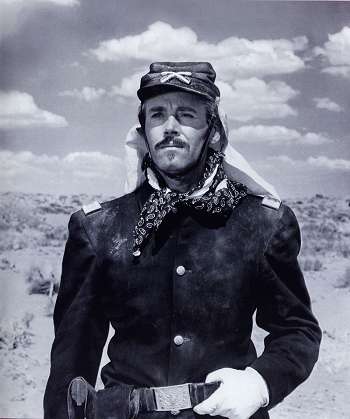
[at Meacham's trading post]
Captain York: No troop or squadron or regiment's gonna keep the Apaches on this reservation unless they want to stay here. Five years ago we made a treaty with Cochise. He and his Chiricahuas and some of the other Apache bands came on the reservation. They wanted to live here in peace... and DID for two years. And then Meacham, here, was sent by the "Indian Ring"...
Silas Meacham: That's a lie! I've been endorsed...
Captain York: The dirtiest, most corrupt political group in our history. And then it began: whiskey but no beef; trinkets instead of blankets; the women degraded; the children sickly; and the men turning into drunken animals. So Cochise did the only thing a decent man could do... he left. Took most of his people and crossed the Rio Bravo into Mexico.
Silas Meacham: He broke his treaty.
Captain York: Yes, rather than stay here and see his nation wiped out.
Silas Meacham: The law is the law and I DEMAND that you soldier boys enforce it!
Lt. Col. Thursday: Any demands you wish to make, you will make through official channels, Mr. Meacham. Do not again employ that word in my presence.
Silas Meacham: No offense, sir, no offense.
[after telling the soldiers to destroy the whiskey in Meacham's storeroom, Col. Thursday starts to leave]
Silas Meacham: I'll protest. I'll write Washington, I'll have you busted!
Lt. Col. Thursday: Mr. Meacham, you're a blackguard, a liar, a hypocrite and a stench in the nostrils of honest men. If it were in my power I'd hang you from the nearest tree, leave your carcass for the buzzards. But, as you are a representative of the United States government, I pledge you the protection and cooperation of my command. Good day, sir.
Note a couple things here. One, both York and Thursday agree that Meachum and other corrupt agents are the problem. Neither one indicts the US government, the US army, or the American public. If not for a few bad apples, there'd be no problem with the Indians: no broken treaties, no Indian wars, no genocide.
Two, the wagon supposedly was burned by a small band of renegade Apaches. These renegades are quicky forgotten as the soldiers' attention turns to Cochise.
Cochise isn't leading the renegades. He has merely fled the reservation to Mexico. In fact, he hasn't done anything warlike or aggressive at all. The bloodshed is caused solely by the renegades.
But juxtaposing them creates the illusion that Cochise is somehow responsible. Thursday concludes that all Indians are bad because no one makes a clearcut distinction between the good and bad ones. Just as the US invaded Iraq after being attacked by Afghanistan-based terrorists, Thursday targets Cochise after a renegade attack.
It's as if the movie wants to have it both ways. Cochise is honorable but the renegades are killers. Since Cochise can't control his own warriors, we have to lock them all up on a reservation. It's not fair to the Indians, but what can you do? The savages need parental supervision like naughty children because they're, well, savages and children.
[York and Beaufort enter the dance after returning from their meeting with Cochise]
Captain York: Cochise has crossed the river, sir. He's coming in with all his people; wants to talk peace.
Lt. Col. Thursday: He's returned to American soil?
Captain York: Yes, sir. Now with the Colonel's permission, I'd like to shake some of this Mexican 'dobe dust and get back to the dance.
Lt. Col. Thursday: There'll be no time for that, Captain. The regiment moves out at dawn.
Captain York: The regiment? Cochise says he'll meet with you and me and Meacham. We'll take a small detail and go unarmed. I've arranged a rendezvous this side of the drygoons.
Lt. Col. Thursday [to RSM O'Rourke]: Sergeant-Major, you'll stop the dance. Pass the word to the first sergeants to prepare their troops to march at dawn. Troop commanders will oblige me by meeting at headquarters at once.
Captain York: Colonel, if you send out the regiment Cochise'll think I've tricked him!
Lt. Col. Thursday: Exactly. We have tricked him. Tricked him into returning to American soil and I intend to see that he stays here.
Captain York: Colonel Thursday, I gave my word to Cochise. No man is gonna make a liar out of me, sir.
Lt. Col. Thursday: Your word to a breech-clouted savage? An illiterate, uncivilized murderer and treaty-breaker? There's no question of honor, sir, between an American officer and Cochise.
Captain York: There is to me, sir!
Captain York: Captain York, you may have commanded your own regiment in the late war; but so long as you command a troop in mine, you will obey my orders.
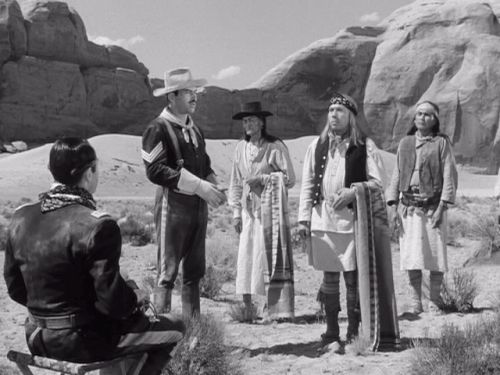
Thursday leads a charge against the Apaches and York can do nothing to stop him. The result is a Little Bighorn-like debacle. So along with a few bad apples as government agents, we have a few bad apples among the Army's officers. Again, York and the regular soldiers are salts of the earth, as humble and honest as the day is long. They'd never do anything bad to the Indians unless ordered to.
Finally, York meets with reporters several years later.
Newspaper reporter: Of course, you're familiar with the famous painting of 'Thursday's Charge,' sir?
Captain York: Yes, I saw it when last I in Washington.
Newspaper reporter: That was a magnificent work.
[to other reporters]
Newspaper reporter: There were these massed columns of Apaches in their warpaint and feather bonnets... and here was Thursday leading his men in that heroic charge!
Captain York [knowing what really happened]: Correct in every detail.
Newspaper reporter [speaking of Col. Thursday]: But what of the men who died with him? What of Collingworth and...
Captain York: Collingwood.
Newspaper reporter: Oh, of course, Collingwood.
Reporter: That's the ironic part of it. We always remember the Thursdays, but the others are forgotten.
Captain York: You're wrong there. They aren't forgotten because they haven't died. They're living — right out there.
[points out the window]
Captain York: Collingwood and the rest. And they'll keep on living as long as the regiment lives. The pay is thirteen dollars a month; their diet: beans and hay. Maybe horsemeat before this campaign is over. Fight over cards or rotgut whiskey, but share the last drop in their canteens. The faces may change... the names... but they're there: they're the regiment... the regular army... now and fifty years from now. They're better men than they used to be. Thursday did that. He made it a command to be proud of.
What it means
We're left with a confounding series of impressions. It's more complex than "Americans good, Indians bad." But it's a mixed message at best.
As opponents, Indians are savage and fierce but also honorable and noble. But they have no history, culture, or religion. Except for a leader or two, they're anonymous warriors. All they ever do is ride across the landscape or stand among the rocks, so we don't even know if they have homes or families.
The Indians have gotten a raw deal, but it's not clear who or what is responsible. Most of the blame goes to a few government agents who sell them whiskey and guns and a few officers who don't respect their autonomy. The American government and culture are decidely not to blame. Most Americans are assumed to be John Wayne-like in their compassion for the poor Indians.
As Slotkin said, the movie celebrates the American victory over the Indians while superficially critiquing it. The virtue of the American military is the final message on the screen, the one viewers are supposed to take away with them. The Indians are little more than plot devices to prove America is a benevolent giant. Like police officers, we don't do anything except keep the peace.
Ford's position on manifest destiny mirrors the neocon position on Bush's invasion of Iraq. According to the neocons, toppling Saddam was the right thing to do. If the White House had planned better and led more competently, the war would've been a resounding success instead of a muddled quagmire. But there's no question we had to subdue the brown-skins in Iraq like we did the brown-skins in the American West. Because a terrorist is just a savage by another name.
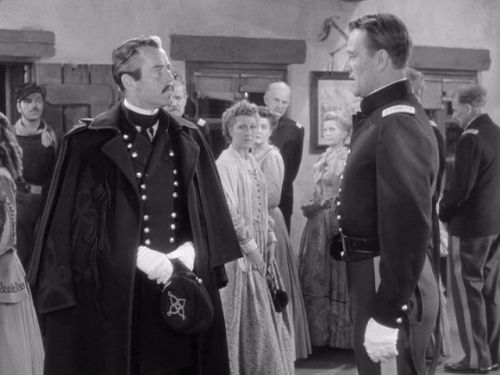
A few final thoughts:
Because of the crackling conflict between Thursday and York, and the expression of some sympathy toward the Apaches, Fort Apache is better than some of the Westerns I've seen. If the first half weren't so leisurely, it might've been a fine movie. Rob's rating: 7.5 of 10.
Related links
Review of She Wore a Yellow Ribbon
Rio Grande Isn't Grand
Straight shootin' with the Duke
The best Indian movies
|
. . . |

|
All material © copyright its original owners, except where noted.
Original text and pictures © copyright 2008 by Robert Schmidt.
Copyrighted material is posted under the Fair Use provision of the Copyright Act,
which allows copying for nonprofit educational uses including criticism and commentary.
Comments sent to the publisher become the property of Blue Corn Comics
and may be used in other postings without permission.